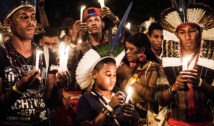
A Quiet Groundswell Among America’s Churches Targeting Racial Divisions Follows in the Wake of George Floyd’s Death
- By Deirdre Pelphrey --
- 17 Jul 2023 --
George Floyd’s death prompted uprisings against injustice throughout the world. That summer was marked by crowds—many of them newly aware of just how fraught racial divisions are in our society. Now, three summers later, the crowds in the streets have been replaced by groups of faith, committed to healing those divisions through discussion, education, prayer and hopefully, reconciliation.
One group, experiencing a rift within its own ranks is the Southern Baptist Convention (SBC). Shaken by backflash against what more conservative elements of the denomination believe to be a liberal shift toward “woke” ideas such as critical race theory and other racial issues, a forum addressing racial reconciliation was held this past month in New Orleans.
At the same time, “eradicating racism” was the subject under discussion of a three-day convention in Philadelphia attended by representatives of mainline and historic Black Protestant denominations.
The SBC, America’s largest Protestant group, which for over a century has sought to extricate itself from its reputation as a support for white supremacy and the Confederate cause during the Civil War, now finds race once more as an apple of discord within itself.
“We need to have honest conversations with people who don’t look like us to find out why we have these differences,” said Fred Luter, a former president of the Southern Baptist Convention and the first African American to lead the denomination. “We need to talk about it, we need to discuss it and we should be able to discuss it in a Christian-like manner and hopefully come up with simple steps of what we can do to bring about unity among the races in the SBC.”
Meanwhile in Philadelphia, the denominations making up Churches Uniting in Christ (CUIC) wrestled with how its groups can bring about “a shared mission to combat racism,” as one part of an eight-point agenda that also includes commitments to promoting unity, celebrating the Eucharist together and continuing theological dialogue. The CUIC gathering also included a prayer walk past some of Philadelphia’s historical sites related to slavery.
Ultimately the different churches will compare notes with other ecumenical groups that are also working on race issues and together their representatives can address bias in its many forms.
Bishop Jeffrey Leath of the African Methodist Episcopal Church and a member of the CUIC Coordinating Council said, “Black and brown communities should be committed to working on issues of anti-bias as we work along with our white brothers and sisters on anti-racism. The African American and various Black and brown communities are plagued with classism, colorism and xenophobia in ways that are just as egregious as racism.”
At Sunday services, SBC and CUIC clergy alike preached sermons on racial healing centered on the verse from the New Testament’s Letter to the Galatians: “There is neither Jew nor Gentile, neither slave nor free, nor is there male and female, for you are all one in Christ Jesus.”
As other U.S. churches and groups of churches join in, holding their own combinations of communication and worship gatherings, Bishop Derek Grier, founder of one such group, Let’s Talk—described as “an environment where pastors can hear, be heard, and address critical race matters of our day”—commented, “It’s vital that we not only preach it and teach it, but we also demonstrate it. Folks will no longer just be informed by CNN or MSNBC or Fox News. They would have heard from their pastor what the Scripture says, what Jesus teaches about these very, very important issues.”
Let’s Talk has sponsored periodic Zoom calls involving a mosaic of evangelical leaders—white, Hispanic, African American and Asian. “We began to talk heart to heart — we wanted to listen as well as be heard,” said Grier. “And as important as conversation was, we recognized nothing changes without action.” Will the increased energy and dialogue undertaken by so many denominations and religious leaders lead to ultimate healing and unity? As Rev. Luter says, “All we can do is hope.”



















